Team bonding: Exploring how mandatory and optional activities affect employees
Nulab Staff
August 05, 2019
In 2016, over 1 in 3 employees in the U.S. were millennials, the most represented generation in the labor force. By 2020, millennials are expected to account for half of the U.S. workforce, and by 2025, 75% of the global workforce.
Millennials are already making waves, but analysts say there’s one thing they prize above all else when job searching: an influential company culture. Company culture creates a personality in the workplace by setting clear definitions for the company mission, values, ethics, goals, and expectations.
Having a powerful company culture can establish strong morale, keep employees motivated, and even boost productivity – but it won’t come free. Establishing a genuine corporate culture can’t happen overnight, and it typically involves dedication and team building. With so much emphasis on creating a professional environment people actually enjoy, team-building activities have become common in many workplaces.
For a closer look at team bonding, we surveyed 1,000 full-time employees for their honest feedback. With their bosses out of earshot, we asked respondents how common team bonding was, which activities were the most popular, and how effective or valuable these events were. Read on to see what we uncovered.
Team-building experience
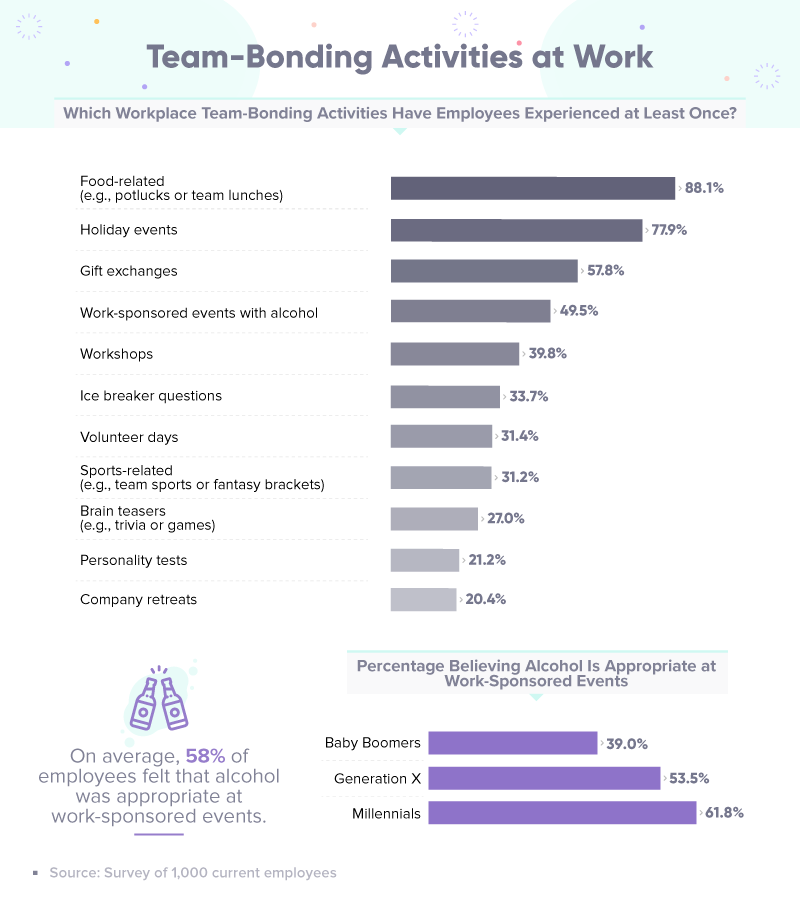
There’s no denying that many employees hate when their companies host mandatory team-building exercises.
After all, there are only so many ice breaker activities and trust-fall exercises employees can handle. Instead, experts suggest companies look at more innovative ideas like game days, scavenger hunts, and “desert island” questionnaire (where participants identify the items they’d bring with them in various categories if ever stranded in an uninhabited location) to help employees bond and build better communication skills and trust.
When asked about team-bonding activities they experienced at least once, 88% of employees said they attended food-related events (like potlucks or team lunches), followed by holiday events (78%), gift exchanges (58%), and work-sponsored activities where alcohol was involved (50%). Well-stocked refrigerators may be a staple in Silicon Valley offices, but it can be a very cost-effective solution for bringing people together and may even help promote healthier eating habits.
While 62% of millennials agreed alcohol was appropriate at work-sponsored team events, older employees (nearly 54% of Gen Xers and 39% of baby boomers) were less comfortable with this activity.
Never too much of a good thing
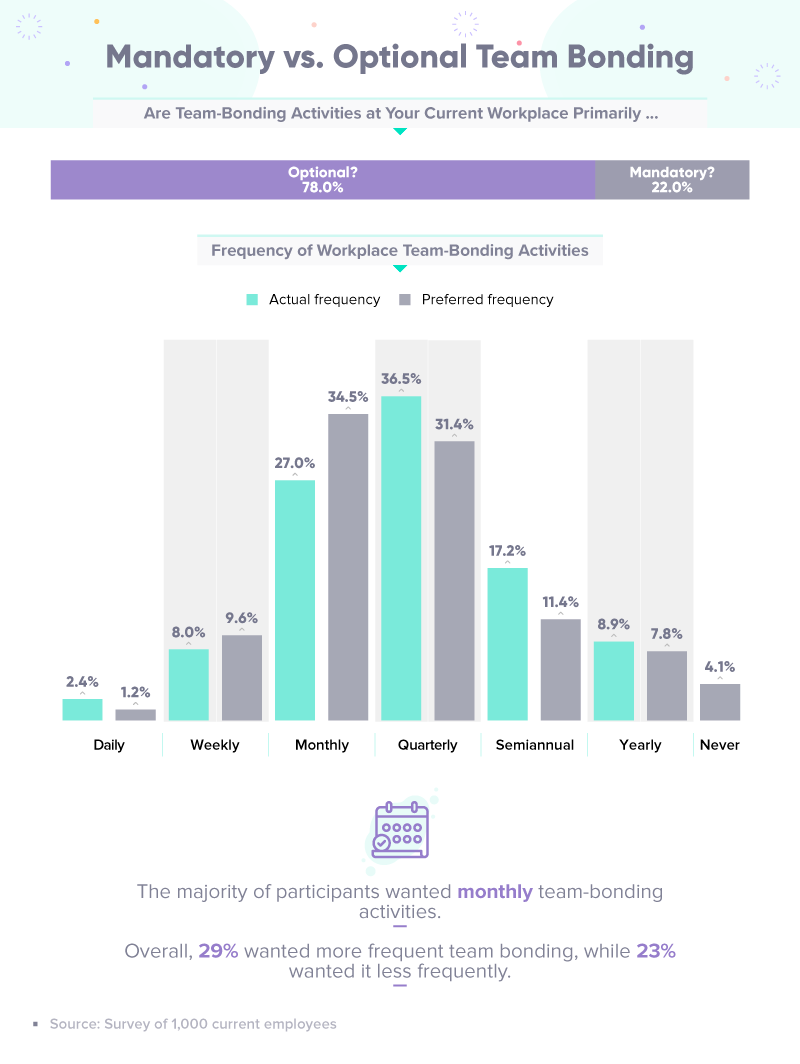
One study found over half of employees spent more time with their “work families” than with their actual families. While that much time around co-workers may deepen some bonds, it can leave employees less inclined toward voluntary work events.
Seventy-eight percent of respondents said team-bonding events at their current workplace were voluntary, while 22% said they were mandatory. And while almost 35% of people wished team-bonding activities were offered monthly, they more often occurred quarterly (nearly 37%). Another 1 in 10 survey respondents wished team bonding were available weekly.
For better or worse
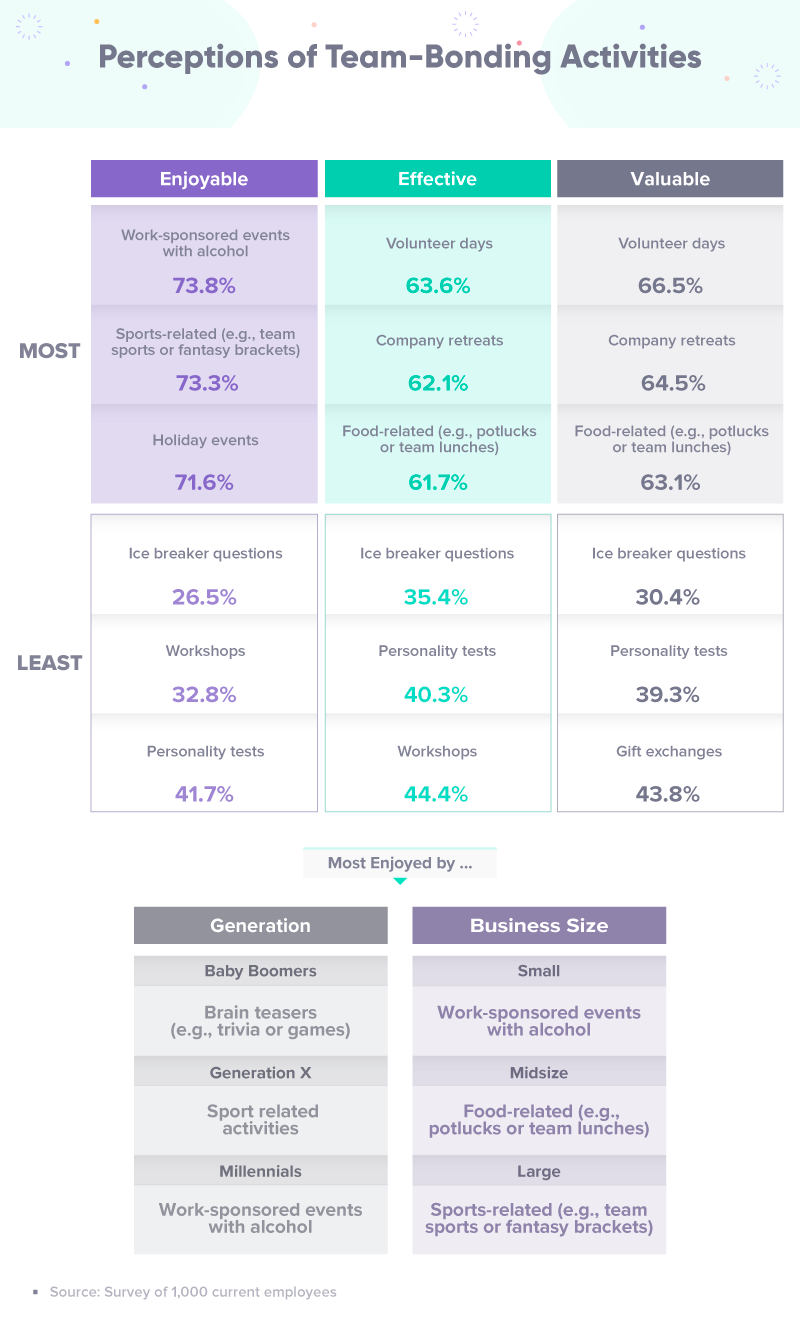
Whether your company hosts team-building events quarterly or every other Friday, it’s fair to admit that not all bonding activities are created equal. Some company-sponsored events may be exciting, while others may seem like unnecessary work meetings.
If you’re hosting a team-building exercise, there’s one activity you might want to steer clear of: ice breaker questions. Ice breakers were considered the least enjoyable, effective, and valuable of all bonding exercises.
Instead, employees typically enjoyed work-sponsored activities with alcohol (74%), sports-related programs (73%), and holiday events (almost 72%). Volunteer days were also considered the most effective (nearly 64%) and valuable (over 66%). One study found an effective volunteer program isn’t just beneficial for creating better employee relationships – it can also promote employee retention, saving companies thousands of dollars by decreasing turnover.
Personal preferences
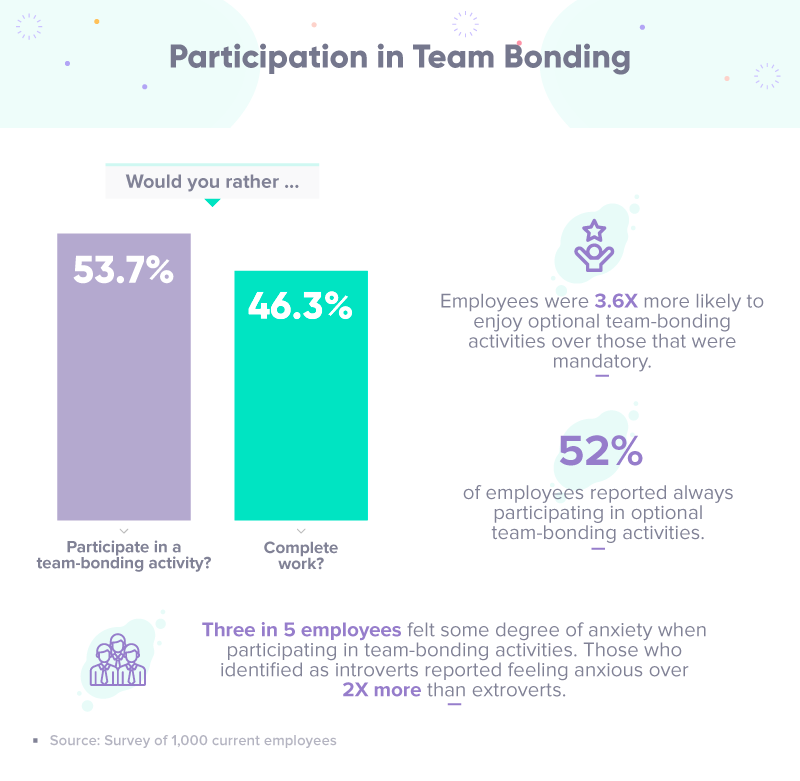
Like positive company culture, building effective relationships with colleagues isn’t something that happens overnight. However, there are plenty of options for establishing effective interpersonal relationships with co-workers, including helping others achieve success, sharing credit for your accomplishments, being transparent, and monitoring your nonverbal communication.
Bonding activities were 3.6 times more likely to be enjoyed when they were optional rather than mandatory. When given a choice, more than half of employees would opt for team-building events, although 3 in 5 experienced anxiety during these activities.
More than a friendly experience
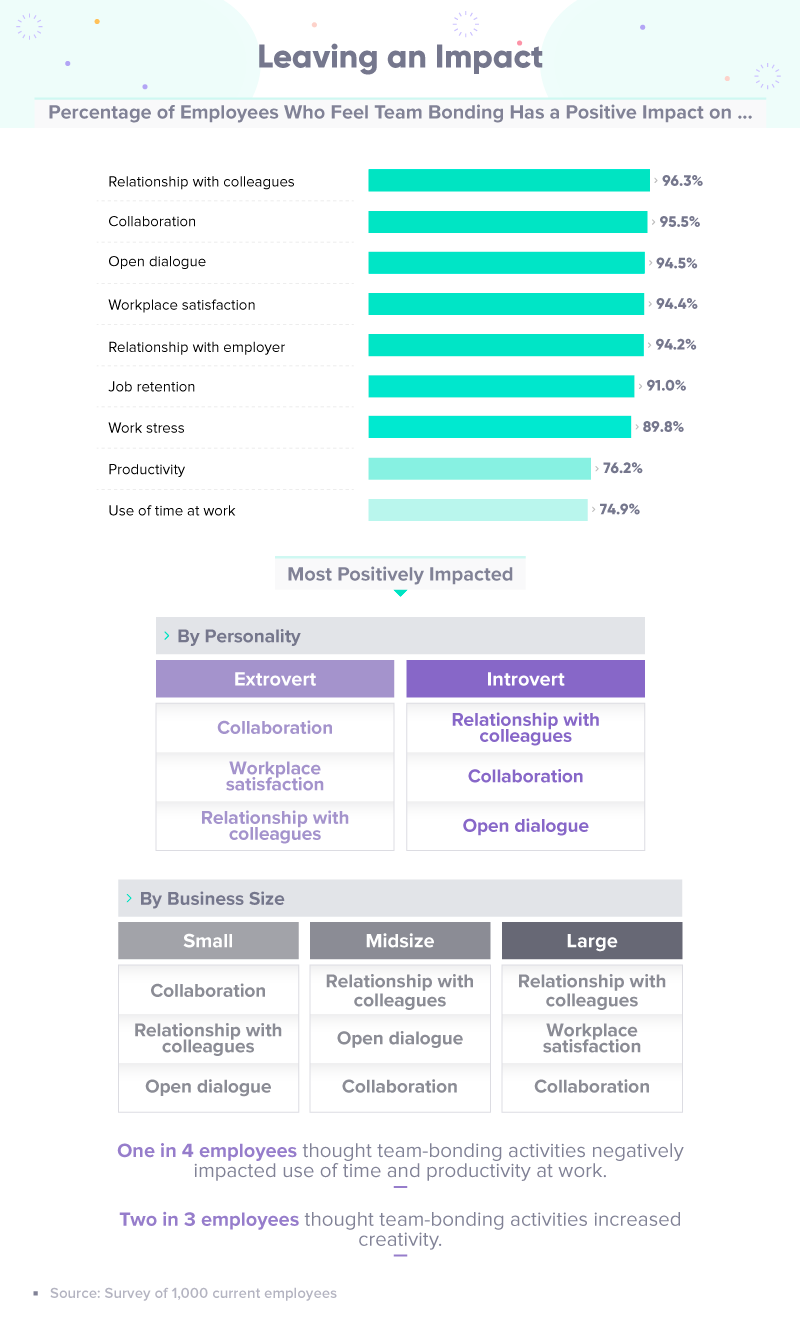
When finding value in team-building exercises, the effects may extend much deeper than relationships between co-workers. While 96% of respondents said their relationship with colleagues was positively impacted by team bonding, collaboration (nearly 96%), open dialogue (over 94%), workplace satisfaction (94%), and employee-employer relationships (94%) weren’t far behind.
How well (and to what extent) your company benefits from team-building efforts may depend on the size of the group and the personalities of the employees. While extroverts were more likely to experience a positive impact on their collaboration and workplace satisfaction, introverts felt more comfortable building relationships and collaborating with their colleagues. Two in 3 respondents suggested team-bonding exercises improved creativity, which can help promote better problem-solving and general workplace efficiency.
When breaking the ice goes too far
Quality team-building activities are beneficial for just about everyone: individuals, their relationships with colleagues, and even the success of the company. But the keyword might be “quality.” Common team-bonding efforts like ice breakers and potlucks may not help anyone and may even seem like an unnecessary use of company time. Instead, employees preferred volunteering and getting to commune with one another over alcohol to build rapport.
At Nulab, we’re passionate about results-driven collaboration software that helps amplify company productivity. With our project management tool Backlog, task management, collaboration across different teams, and secure file sharing are all a breeze. Together, we’ve created an ecosystem of collaborative solutions designed with your industry in mind! The things that help make your team special are the same elements that will help your business succeed. Get the solutions you need at Nulab.com.
Methodology and limitations
These data were curated via survey using Amazon’s Mechanical Turk platform. Participants had to be a current employee and in-office/in-house at their current workplace. They also had to have participated in a team-bonding activity at least once. There were a total of 1,000 participants.
Percentage of participants in each industry:
- Education – 17.1%
- Medical and Health Care – 14.0%
- Finance and Insurance – 12.2%
- Wholesale and Retail – 11.5%
- Technology – 10.1%
- Hotel, Food Services, and Hospitality – 7.3%
- Government and Public Administration – 6.6%
- Manufacturing – 6.2%
- Information Services and Data Processing – 5.7%
- Arts, Entertainment, and Recreation – 5.3%
- Marketing and Advertising – 4.2%
65.4% of participants described themselves as introverted, and 34.6% described themselves as extroverted. 35.9% of participants worked at a small business, 36.2% at a midsize business, and 27.8% at a large business. The youngest participant was 18, and the oldest was 87, with a mean of 36.2 and a standard deviation of 10.2.
Exaggeration and selective memory are potential issues that can arise because the data rely on self-reported information.
The data were not statistically tested. Due to the exploratory nature of this study, future research could look into more granular data regarding the specific activities in different work environments.
Sources
- https://www.pewresearch.org/fact-tank/2018/04/11/millennials-largest-generation-us-labor-force/
- https://www.inc.com/peter-economy/the-millennial-workplace-of-future-is-almost-here-these-3-things-are-about-to-change-big-time.html
- https://www.forbes.com/sites/larryalton/2017/02/17/why-corporate-culture-is-becoming-even-more-important/#5c31f9e969da
- https://www.thebalancecareers.com/what-is-company-culture-2062000
- https://hbr.org/2017/06/changing-company-culture-requires-a-movement-not-a-mandate
- https://www.forbes.com/sites/brianscudamore/2016/03/09/why-team-building-is-the-most-important-investment-youll-make/#a3220a1617fc
- https://www.entrepreneur.com/article/306246
- https://www.inc.com/chirag-kulkarni/3-reasons-why-investing-in-company-meals-will-boost-your-bottom-line.html
- https://www.cnbc.com/2017/12/14/this-study-identified-the-5-people-that-make-up-a-work-family.html
- https://www.charities.org/news/business-case-employee-volunteer-skills-giving-programs
- https://www.thebalancecareers.com/developing-effective-work-relationships-1919386
- https://www.allbusiness.com/the-importance-of-creativity-in-the-workplace-24566-1.html
Fair Use Statement
As tasty as another potluck might sound, quality time with your co-workers could prove much more beneficial. Spread the word by sharing the results of this study for any non-commercial use with a link back to this page to credit to our team.

